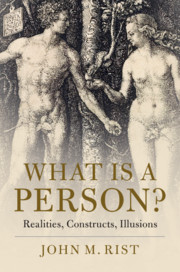Book contents
- What is a Person?
- What is a Person?
- Copyright page
- Contents
- Acknowledgments
- Introduction
- Part I Constructing the ‘Mainline Tradition’
- 1 The First Foundations: Plato and Aristotle
- 2 From Stoic Individuals and Personae to Christian Persons
- 3 Mixtures: Plotinus, Porphyry, Nemesius
- 4 Augustine’s Personae: Theology, Metaphysics, History
- 5 The Definition: Boethius and Richard of Saint Victor
- 6 Toward a Synthesis: Thomas Aquinas
- 7 Between Two Worlds: Duns Scotus
- Part II No God, no Soul: What Person?
- Part III Toward Disabling the Person
- Part IV Persons Restored or Final Solution?
- Epilogue or Epitaph?
- Appendix The World of Rights Transformed Again
- Bibliography
- Index
5 - The Definition: Boethius and Richard of Saint Victor
from Part I - Constructing the ‘Mainline Tradition’
Published online by Cambridge University Press: 05 December 2019
- What is a Person?
- What is a Person?
- Copyright page
- Contents
- Acknowledgments
- Introduction
- Part I Constructing the ‘Mainline Tradition’
- 1 The First Foundations: Plato and Aristotle
- 2 From Stoic Individuals and Personae to Christian Persons
- 3 Mixtures: Plotinus, Porphyry, Nemesius
- 4 Augustine’s Personae: Theology, Metaphysics, History
- 5 The Definition: Boethius and Richard of Saint Victor
- 6 Toward a Synthesis: Thomas Aquinas
- 7 Between Two Worlds: Duns Scotus
- Part II No God, no Soul: What Person?
- Part III Toward Disabling the Person
- Part IV Persons Restored or Final Solution?
- Epilogue or Epitaph?
- Appendix The World of Rights Transformed Again
- Bibliography
- Index
Summary
Augustine believes that human worth is explicable only given the existence of a beneficent God – plus, of course, a related account of the soul – but his failure to account for the miraculous combination of soul and body left much room for further Christian thought about persons. That leaves us wondering what further progress would be made on the lines he indicated. It is therefore time to return to the semi-Aristotelian Platonist Boethius, who like Augustine suffers from the inability to understand what he is (Consolation 1.P.2.13; 1.P.6.40–42, etc.). The resulting definition that a person is an individual substance of a rational nature reveals in the word ‘substance’ an Aristotelian metaphysics more technical than the language regularly used by Augustine: that man is a mortal rational animal (On the Trinity 7.3.7; City of God 9.13). Yet the Consolation’s platonizing Lady Philosophy might find this definition excessively abbreviated, even to the point of being misleading, and Boethius, specifically talking ‘philosophy’ rather than ‘theology’, to have lost sight of the immortality of the soul – hence of the key to our God-created nature in his own image. Nor does Boethius attend to Augustine’s emphasis on history, thus setting an unfortunate precedent for subsequent ages.
- Type
- Chapter
- Information
- What is a Person?Realities, Constructs, Illusions, pp. 56 - 61Publisher: Cambridge University PressPrint publication year: 2019



